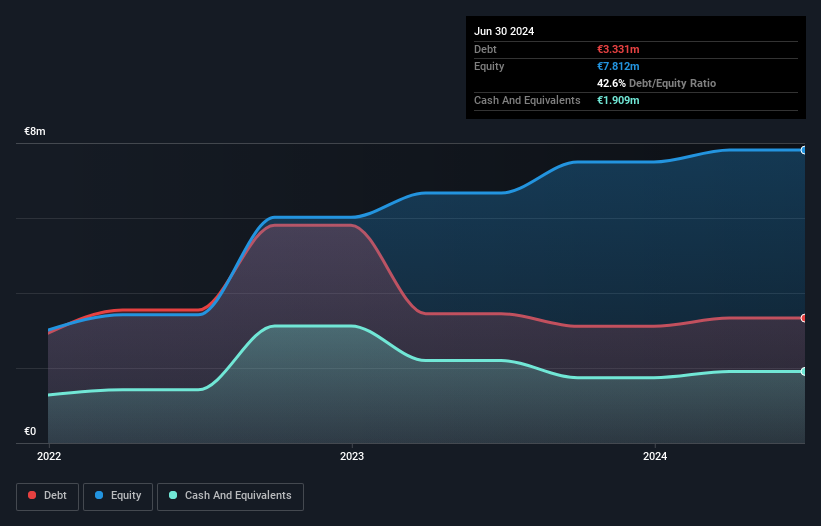Some say volatility, rather than debt, is the best way to think about risk as an investor, but Warren Buffett famously said that 'Volatility is far from synonymous with risk.' It's only natural to consider a company's balance sheet when you examine how risky it is, since debt is often involved when a business collapses. We note that Pozzi Milano S.p.A. (BIT:POZ) does have debt on its balance sheet. But is this debt a concern to shareholders?
When Is Debt A Problem?
Debt and other liabilities become risky for a business when it cannot easily fulfill those obligations, either with free cash flow or by raising capital at an attractive price. In the worst case scenario, a company can go bankrupt if it cannot pay its creditors. However, a more frequent (but still costly) occurrence is where a company must issue shares at bargain-basement prices, permanently diluting shareholders, just to shore up its balance sheet. Of course, plenty of companies use debt to fund growth, without any negative consequences. The first step when considering a company's debt levels is to consider its cash and debt together.
Check out our latest analysis for Pozzi Milano
What Is Pozzi Milano's Debt?
As you can see below, Pozzi Milano had €3.33m of debt, at June 2024, which is about the same as the year before. You can click the chart for greater detail. However, it also had €1.91m in cash, and so its net debt is €1.42m.

How Strong Is Pozzi Milano's Balance Sheet?
Zooming in on the latest balance sheet data, we can see that Pozzi Milano had liabilities of €4.92m due within 12 months and liabilities of €2.02m due beyond that. On the other hand, it had cash of €1.91m and €4.85m worth of receivables due within a year. So its liabilities total €189.2k more than the combination of its cash and short-term receivables.
Having regard to Pozzi Milano's size, it seems that its liquid assets are well balanced with its total liabilities. So it's very unlikely that the €16.0m company is short on cash, but still worth keeping an eye on the balance sheet.
In order to size up a company's debt relative to its earnings, we calculate its net debt divided by its earnings before interest, tax, depreciation, and amortization (EBITDA) and its earnings before interest and tax (EBIT) divided by its interest expense (its interest cover). Thus we consider debt relative to earnings both with and without depreciation and amortization expenses.
Pozzi Milano has net debt of just 0.82 times EBITDA, indicating that it is certainly not a reckless borrower. And it boasts interest cover of 8.2 times, which is more than adequate. The modesty of its debt load may become crucial for Pozzi Milano if management cannot prevent a repeat of the 27% cut to EBIT over the last year. When a company sees its earnings tank, it can sometimes find its relationships with its lenders turn sour. The balance sheet is clearly the area to focus on when you are analysing debt. But it is future earnings, more than anything, that will determine Pozzi Milano's ability to maintain a healthy balance sheet going forward. So if you want to see what the professionals think, you might find this free report on analyst profit forecasts to be interesting.
Finally, while the tax-man may adore accounting profits, lenders only accept cold hard cash. So we always check how much of that EBIT is translated into free cash flow. During the last three years, Pozzi Milano burned a lot of cash. While that may be a result of expenditure for growth, it does make the debt far more risky.
Our View
While Pozzi Milano's conversion of EBIT to free cash flow makes us cautious about it, its track record of (not) growing its EBIT is no better. At least its net debt to EBITDA gives us reason to be optimistic. Taking the abovementioned factors together we do think Pozzi Milano's debt poses some risks to the business. While that debt can boost returns, we think the company has enough leverage now. There's no doubt that we learn most about debt from the balance sheet. However, not all investment risk resides within the balance sheet - far from it. For instance, we've identified 5 warning signs for Pozzi Milano (1 is significant) you should be aware of.
If, after all that, you're more interested in a fast growing company with a rock-solid balance sheet, then check out our list of net cash growth stocks without delay.
New: Manage All Your Stock Portfolios in One Place
We've created the ultimate portfolio companion for stock investors, and it's free.
• Connect an unlimited number of Portfolios and see your total in one currency
• Be alerted to new Warning Signs or Risks via email or mobile
• Track the Fair Value of your stocks
Have feedback on this article? Concerned about the content? Get in touch with us directly. Alternatively, email editorial-team (at) simplywallst.com.
This article by Simply Wall St is general in nature. We provide commentary based on historical data and analyst forecasts only using an unbiased methodology and our articles are not intended to be financial advice. It does not constitute a recommendation to buy or sell any stock, and does not take account of your objectives, or your financial situation. We aim to bring you long-term focused analysis driven by fundamental data. Note that our analysis may not factor in the latest price-sensitive company announcements or qualitative material. Simply Wall St has no position in any stocks mentioned.
About BIT:POZ
Pozzi Milano
Designs, produces, and distributes a range of tableware and home décor items in Italy and internationally.
Solid track record with excellent balance sheet.
Market Insights
Community Narratives




